How to Play Roulette
The roulette wheel is one of the most iconic features of a casino and provides players with the opportunity to enjoy a thrilling game that is easy to understand. French for “little wheel”, roulette as it is played today dates back to the late 18th century, with a rudimentary version of the game even introduced by the mathematician Blaise Pascal in the 1600s. The history of roulette adds to its allure and the game continues to attract punters both online and in land-based venues, going from strength to strength in the digital age.
Where to Play Roulette
Roulette is one of the world’s most popular casino games and can be found at venues across Europe and the USA, many of which also offer electronic roulette.
You can play roulette online at sites such as Lotto Games, where there are a range of options including both American and European roulette, multiplayer roulette and even video roulette. Play for free if you just want to have fun or sign up and bet real cash to try and beat the house!
Basic Rules
Roulette involves betting on which segment of a roulette wheel a small ball will fall into. In each round, the wheel will be spun one way and the ball the other way, before it eventually drops into one of the various little pockets, which correspond to a different number from 0 to 36. The segments alternate between red and black and the numbers are ordered in a set random sequence. Going clockwise, the numbers on a standard European roulette wheel appear in the following order:
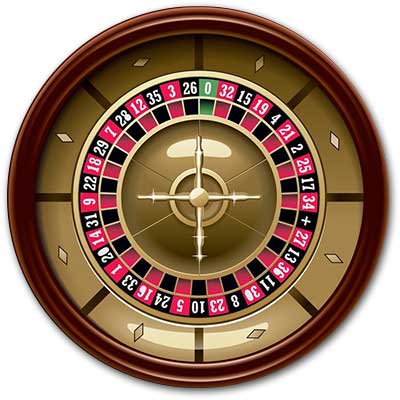
- 0
- 32
- 15
- 19
- 4
- 21
- 2
- 25
- 17
- 34
- 6
- 27
- 13
- 36
- 11
- 30
- 8
- 23
- 10
- 5
- 24
- 16
- 33
- 1
- 20
- 14
- 31
- 9
- 22
- 18
- 29
- 7
- 28
- 12
- 35
- 3
- 26
American Roulette tables use a different sequence and have a 00 section in addition to a 0 segment.
Players bet by placing chips onto a specially designed board, which is laid out to show all the different numbers as well as various other wagering options. These wagers can be divided into Inside bets, which are placed on the numbers themselves, and Outside bets.
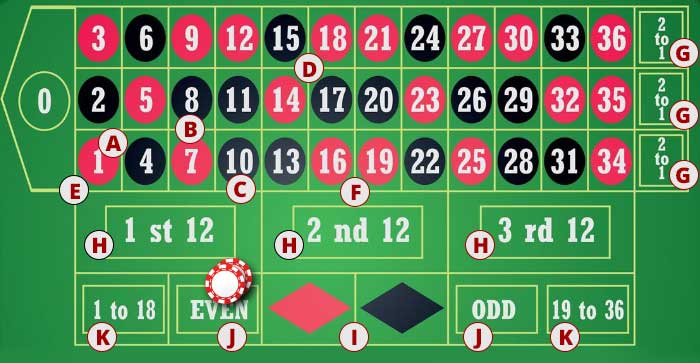
- AStraight Bet (Single Number)
- BSplit Bet (Two Numbers)
- CStreet Bet (Three Numbers)
- DCorner Bet (Four Numbers)
- ETop Line (Five Numbers)
- FLine Bet (Six Numbers)
- GColumn Bet
- HDozens Bet
- IRed / Black Bet
- JOdd / Even Bet
- KHigh / Low Bet
Inside Bets:
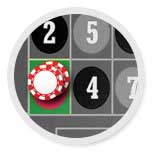
Straight bets
Betting on a single number. The payout is 35:1.
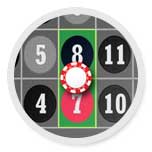
Split bets
Betting on two adjoining numbers, either vertically or horizontally. The payout is 17:1.
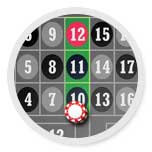
Street bets
Betting on a horizontal row, e.g. 1-3. The payout is 11:1.
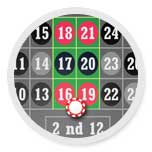
Line bets
Betting on a block of six numbers across two adjoining rows, e.g. 1-6. The payout is 5:1.
Outside bets:
These bets are placed on the perimeter of the board and include:
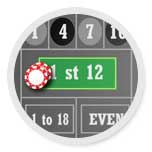
Dozen Bets
Betting on a block of 12 numbers, either 1-12, 13-24 or 25-36. The payout is 2:1.
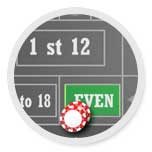
Even or Odds
Placing a bet on whether or not the roulette ball will fall into an even or odd-numbered slot. The payout offered is 1:1.
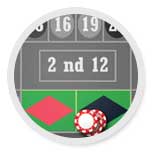
Red or Black
Placing a wager that the ball will fall into a black or red slot. The payout is 1:1 and neither 0 nor 00 count for the purposes of the bet (as these spaces are green).
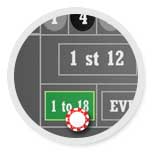
High or Low
Betting on the ball falling into a slot for low numbers between 1 and 18 or a high set of numbers between 19 and 36. Should the ball land on 0 or 00, the player loses their wager. The payout is 1:1.
La Partage/En Prison
In European roulette, two additional bets are sometimes offered: La Partage and En Prison. La Partage comes into play when the ball lands on the slot for zero, with players who placed even-money wagers receiving half their bet. This reduces the house edge considerably to just 1.35 percent. With En Prison, a player’s bet is placed “in prison” when a ball lands on zero, with the dealer putting a marker over the chips. Another spin is made, with the player getting their original bet back should they win, but losing their wager if the ball lands on zero again.
On the whole, the house edge in roulette comes from the presence of a zero on the wheel. The odds of a straight bet, for example, are 1 in 36 rather than 1 in 35. Even money bets are not quite a 50-50 chance either, as the ball could drop into the zero section. In American roulette, when there is also a double zero pocket, the odds are slightly worse.
Some venues may offer a number of side bets, referred to as French bets, which provide a bit of variety to European roulette:
Voisins du zero (Neighbours of Zero): A term used to refer to the series of numbers from 22 to 25 inclusive on a standard European roulette wheel. Players bet nine chips or multiples of nine, with two chips on the 0-2-3 slots, one chip on the 4/7, 12/15, 18/21, 19/22 and 32/35 splits and two chips on the 25/26/28/29 corner area.
Tiers (Third): A term used to refer to the series of numbers from 27 to 33 inclusive on a European roulette wheel. Players bet six chips or multiples of six, with one chip each on the splits of 5/8, 10/11, 13/16, 23/24, 27/30 and 33/36.
Orphelins (Orphans): A term used to describe numbers on the wheel that are not included in either the Voisins or Tiers group - 17, 34, 6, 1, 20, 14, 31 and 9. A player bets five chips or multiples of five, with one chip on 1 and a chip on each split of 6/9, 14/17, 17/20 and 31/34.
Etiquette
It is important to realise that you are only allowed to place bets at certain times. The dealer will announce when it is time to put down your chips and you should respond in a timely manner. It will then be announced that there can be ‘no more bets’, and at this time you will have to wait if you have missed your chance.
After the wagers have been placed, keep your hands away from the table and make sure not to touch the bets. The roulette area of a casino can become quite excitable, but remember to behave in a polite and civilised way, respecting staff and other players alike.
Every player receives a different set of chips which can only be used at the roulette table. Once you have finished playing, you can ask the dealer to exchange your roulette chips for casino chips, which can be cashed in at the cage.
Roulette Strategy
Devising a winning roulette strategy is a challenge that many fans of the game have tried to master over the years, and lots of players have enjoyed short-lived success. However, as with any game of chance, the odds are tilted in the casino’s favour and no system is unbeatable. It is best to view a visit to the roulette table as a fun experience rather than a way to make money, and never bet what you can’t afford to lose.
Straight bets offer the biggest rewards, but the wagers with the best chance of success are even money bets such as red or black, which give you a near 50-50 likelihood of winning. European roulette offers better odds than American roulette if you have a choice between the two. Popular roulette strategies involve even money bets and include:
The Martingale System - A preferred strategy for many players and the easiest to follow, the Martingale system suggests that when you lose a bet, you follow it up with a wager that is worth double the last bet. For example, you might bet £5 and lose, then £10 and lose again, but if your third bet of £20 wins, you have recouped your losses as you would have spent £35 and won £40. The theory may sound fool-proof, but the stakes soon start to escalate on a losing run and nobody’s pockets are infinitely deep.
The Labouchere System - Otherwise known as the cancellation system, this theory revolves around a player going to the casino with a pre-determined goal to make a certain amount of money. They will then write down numbers which add up to the profit aim they have set for themselves, and start with a bet which is equal to the first and last numbers written down. If the wager wins, you cross off the first and last numbers on the list and use the first and last numbers that are remaining to work out your next bet. If the bet loses, you add what you have just lost to the end of the list and start again. For example, if a player has set out to make £10 and written down the numbers 1, 2, 3 and 4, a number of different scenarios could unfold, including:
- The first bet is £5 (1+4) and wins. The numbers 1 and 4 are crossed off and the next bet of £5 (2+3) also wins. The numbers are all crossed out and you have reached your £10 profit aim, having bet £10 and received a return of £20.
- The first bet is £5 (1+4) and loses. The number 5 is written at the end of your list and the next bet is £6 (1+5). This bet wins (£12) and the numbers 1 and 5 are crossed out. The next bet is £6 (2+4) and wins (£12). The numbers 2 and 4 are crossed out. The next bet is £3 as this is the only number left to be crossed out. The bet wins (£6) and you have reached your profit aim of £10, having spent £20 and won £30.
Like the Martingale System, the Labouchere model works in theory but has the same drawbacks, as a losing run will soon start to leave a player short of cash.
The Reverse Labouchere System - The idea works along the same lines as the Labouchere System, except that players increase their bet when they win, rather than when they lose. The driving force behind this theory is Norman Leigh, who wrote the book Thirteen Against the Bank about the exploits of a group of players, including himself, who bet on six even money bets at the same time.
Important Terms:
Visit the Casino Glossary to find out more about some of the terms which you might come across when playing roulette or other casino offerings.
